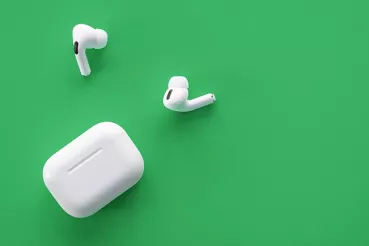Inna Husain, MD, thinks the larynx, or voice box, is a beautiful organ. Which is a good thing, since she spends a lot of her time looking at this hollow tube that sits atop the windpipe and contains the vocal cords.
When we speak, air passing through the larynx causes the vocal cords, or vocal folds, to vibrate. The vibrations make the raw sounds we shape into language with our mouths. The larynx quite literally gives us a voice.
A laryngologist — and director of the Voice, Airway and Swallowing Program at Rush University Medical Center — Husain specializes in treating voice problems. Here, she offers some insights and advice to help you better understand and take care of your voice:
Common causes of voice problems
"When people notice their voice sounds different, they generally say they have laryngitis," Husain says. Usually, though, chronic voice changes are not primarily due to an acute inflammation of the larynx — the literal meaning of the word laryngitis. It's a descriptive term, not a diagnosis.
These are the more likely culprits:
Dysphonia
The most common cause of voice problems is actually muscle tension dysphonia, which happens when your laryngeal muscles start to contract in an abnormal way.
This often occurs during stressful period, such as a difficult time at work or in your relationship, or right after giving birth.
"Your larynx is very sensitive to stress and other emotions," Husain explains. "That lump in your throat when you see a sad movie? That's your larynx taking on your emotional response." If the emotions last for weeks or months, the abnormal muscle contractions that result can make your voice feel tired, or like it's breaking up.
Laryngopharyngeal reflux, or LPR
Another common cause of voice problems is laryngopharyngeal reflux (frequently called LPR), which occurs when stomach acid travels up your esophagus to the back of your throat, often soon after you've eaten.
This leads to inflammation at the base of the voice box, which in turn causes muscle tension that can make your voice feel strained or weak.
Voice problems may signal more serious health issues
Most voice problems, including muscle tension dysphonia and laryngopharyngeal reflux, are highly treatable. But they can sometimes signal serious illness. A weakened, quieter voice, for example, may be an early sign of Parkinson's disease or amyotrophic lateral sclerosis (ALS).
"Sometimes patients come in complaining of a weak voice, and then upon examination I'll notice tremors or rigidity — possible signs of Parkinson's," Husain says.
Other conditions that can cause voice changes range from fungal infections to autoimmune diseases to lung cancer. Although rare, a form of throat cancer can develop in the larynx itself.
(When Husain diagnoses underlying conditions such as these, she refers patients to other experts at Rush, but often remains part of the care team to treat the voice-related problems.)
Voice problems aren't just for performers
Most growths in the larynx are noncancerous. "If you're using your voice a lot for a long period of time, you may develop nodules, which are like calluses of the vocal cords,' " Husain explains. They can make your voice sound breathy or scratchy, or feel tired.
People most at risk for this problem are those who use their voices professionally — from singers and newscasters to teachers, coaches, clergy and anyone who spends hours speaking every day.
"A lot of people don't tend to think of themselves as voice professionals if they're not doing something like singing or acting," Husain says. "Teachers, for example, often don't realize they might be causing damage to their vocal cords, and they don't see a doctor until they have significant dysfunction. So I always encourage teachers to come in, get their voice checked and learn proper vocal hygiene."
Tips for a healthy voice
Voice professionals aren't the only ones who can benefit from proper vocal hygiene. To keep your voice healthy, Husain recommends avoiding habits that can damage it:
- Glottic fry (often called vocal fry). Speaking in a low, rattling register can put a strain on your vocal cords.
- Not staying hydrated. "Vocal cords need to be lubricated in order to work properly," Husain says. "If they dry out, it puts a lot of strain on them, and the quality of sound they produce will be different." To avoid this problem, drink plenty of water throughout the day. Each person's hydration needs are different; clear urine is a good sign that you're drinking enough.
- Frequent throat clearing. Throat clearing puts a lot of pressure on your vocal cords. So it's best to ditch the habit, if you can. When you need to clear your throat, try suppressing the urge, swallowing, taking a small sip of water or exhaling forcefully through your mouth.
Your annual physical probably will not reveal vocal cord problems. The best way to really assess what's going on ... is for someone attuned to the nuances of vocal changes to listen to your voice — and then look at your vocal cords.
You can — and maybe should — get a voice check-up.
If you're even a little worried about a change in the way your voice sounds or feels, Husain recommends making an appointment with a laryngologist.
"Your annual physical probably will not reveal vocal cord problems," Husain says. "The best way to really assess what's going on with the voice is for someone attuned to the nuances of vocal changes to listen to your voice — and then look at your vocal cords."
To do this, she examines patients with top-of-the-line imaging equipment that only voice specialists tend to use: a high-definition laryngoscope (a tube with a camera on the end that captures detailed images of the larynx) and video stroboscopy (a technique that uses flashing light to make vocal cord vibrations visible; they're too rapid to see with a naked eye).
By using the most precise tools available, she can make more precise diagnoses. She's seen several patients, for example, who had been diagnosed with laryngopharyngeal reflux but weren't responding to LPR medications. After examining them, she was able to see that the problem was actually something else — nodules, for example, or paresis (a kind of muscle weakness).
Treating voice problems
Particularly if they're identified early, most voice problems are highly treatable — with the right approach:
- For patients with laryngopharyngeal reflux, Husain recommends lifestyle changes, medications and improved vocal hygiene.
- For patients with muscle tension dysphonia or nodules, Husain works with a voice therapist at Rush to help teach them techniques for reducing strain when they speak.
- For people with vocal cord paralysis or weakness, Husain can inject fillers to help bulk up the vocal cord so that the opposite, working vocal cord can once again reach it. This can make the voice less breathy.
- For those whose voice weakness is due to aging, bulking up the vocal cords with injections of fat or other fillers can help make the voice sound younger.
"We don't just say, ‘Oh, it's age-related so there's nothing to be done,' " Husain says. "There are plenty of things we can do to strengthen the voice and get you back to sounding like yourself."




